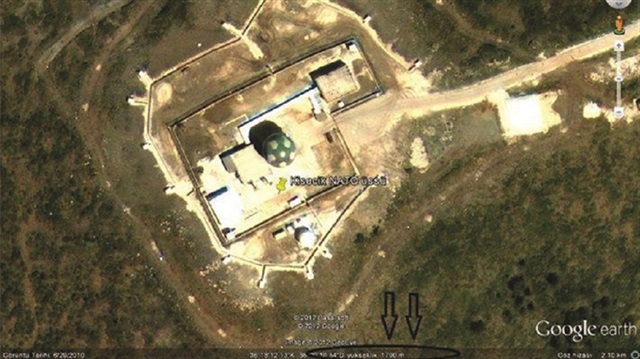
The U.S. army, which is capable of spotting the movements of Turkey’s fighter jets and drones through the radars that are part of the NATO network, shares possible targets with PKK/PYD terrorists
The U.S. is said to be supplying terrorists from the Kurdistan Workers’ Party (PKK)’s Syrian offshoot, the PYD, in Syria’s Afrin with instantaneous intel received from the Kisecik Radar Base, which is part of the NATO network and is capable of spotting jets, drones and missiles amid Turkey’s ongoing Olive Branch Operation in the region.
The U.S. army, which is capable of spotting the movements of Turkey’s fighter jets and drones through the radars that are part of the NATO network, shares possible targets with PKK/PYD terrorists.
PKK/PYD terrorists then alter their positions in accordance with the intel they receive.
The radar, which is capable of spotting warplanes, drones and even missiles targeting Afrin, is located in the İskenderun town of Arsuz in Turkey’s Hatay province and was established in 2004 on the summit of Mount Amanos as part of the NATO Kisecik Radar Base, which the U.S. uses to its benefit.
A radar base that is part of the same compound as Kisecik is located on the zero point on the border between Hatay and Yayladağı.
The radars in question that are located at the bases of both Mount Kel and Kisecik are capable of monitoring all aerial activity within a 4,000-kilometer radius.
Thus, the U.S. is capable of monitoring all activities in most of Syria’s territories from the bases established under the umbrella of NATO, in addition to Kisecik and Mount Kel, includes the Kürecik base in the province of Malatya, which hosts the most state-of-the-art radar of all three.
With a radius of 1000 kilometers, the radar is capable of monitoring all of Syria, Iraq and Iran, even as far as Cyprus.
Turkey’s aerial network and collected intel, which covers NATO’s southeastern borders, are shared openly. However, some information can be withheld by Turkey, especially in the case of a national operation.
However, it’s not yet clear how successful this practice has been, because despite these measures, the U.S. is said to share its critical data obtained from its radars with PKK terrorists.
Operation Olive Branch was initiated on Jan. 20 in Afrin to establish security and stability, eliminate PKK/KCK/PYD-YPG and Daesh terrorists, and save locals from their oppression and cruelty.
The operation is being carried out under the framework of Turkey’s rights based on international law, UN Security Council resolutions, its self-defense rights under the UN charter, and respect for Syria's territorial integrity.
Afrin has been a major hideout for the Kurdistan Workers’ Party (PKK)’s Syrian offshoot, the PYD, since July 2012, when the Assad regime in Syria left the city to the terror group without putting up a fight.
The PKK is listed as a terrorist organization by Turkey, the European Union and the United States. The PKK has been conducting armed violence in the southeastern part of Turkey since 1984. More than 40,000 people, mostly civilians, have been killed in the three-decade long conflict.
Hello, the comments you share on our site are a valuable resource for other users. Please respect other users and different opinions. Do not use rude, offensive, derogatory, or discriminatory language.
The floor is all yours.











